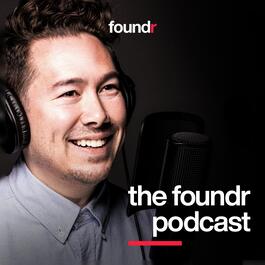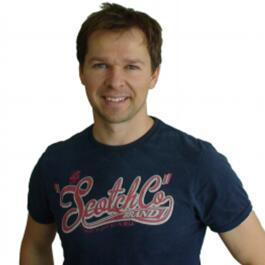
283: Splasheo Founder Gideon Shalwick on Video Marketing, Personal Branding, And Discovering Your ‘Why’
Gideon Shalwick believes there’s one trait every entrepreneur needs, and it’s not persistence, a strong work ethic, or creativity. It’s self awareness. His own desire to better understand himself has led him down a winding road of serial entrepreneurship and self-exploration. It’s what first inspired Shalwick to drop out of the 9-to-5 club early in his career, move to another country with his wife, and start fresh. The pursuit of his true calling led him to publish a successful ebook in 2006, and two years later, develop a blogging training product that boasts over 40,000 subscribers. Meanwhile, Shalwick was also building up a personal brand as an expert in video marketing. But his journey didn’t stop there. In 2012, Shalwick founded video captioning service Splasheo, which has become a major source of passive income. He followed that success in 2014 with Veeroll, a SaaS company that automates the production of video ads for YouTube, Instagram, and Facebook, and now dominates the video advertisement space. While Shalwick saw great success with these companies, he found that tug of self-discovery pulling at him again. He realized he had become so caught up in the startup world that, in the process, had forgotten who he was. So he decided to walk away from the projects he spent over a decade building. Now, he’s in a period of self-rediscovery and is sharing his entrepreneurial wisdom with others while plotting his next move. Starting Over Five years into his career, Shalwick decided to start over, for the first time. He had graduated with an electrical engineering degree from the University of Canterbury in New Zealand and immediately recognized that he didn’t enjoy working for someone else. In an attempt to try another path, Shalwick got his master’s degree in engineering management, which focused more on the people side of business. Still, he felt frustrated by his job. “I don’t think there was any job in the world that would allow me to live out my potential the way that I wanted to, so I felt really stuck,” Shalwick says. He turned to his wife and suggested that they quit their jobs, move to Australia, and start from scratch. At first, the plan was for Shalwick to find a job in Brisbane as their ticket in. But three months later, he still hadn’t found employment. He asked his wife to try applying for jobs as well and, within a week, she had three offers. While this allowed them to successfully relocate, Shalwick still had no idea what to do with his own career. Millionaire Secrets Shalwick began reading books on entrepreneurship, with the hope that they would point him in the right direction. It was Rich Dad, Poor Dad, which talks about the importance of building up an asset, that eventually struck a chord. Shalwick wondered how he could build up his own asset and started to explore a variety of options. He considered everything from franchises to a dog-washing business, but ultimately ended up attending a book-writing course that gave him his first taste of entrepreneurship. In 2006, Shalwick wrote and sold a personal development ebook for $47. The title? Millionaire Dropout Secrets. “I blush when I think about the title, but I have an excuse,” Shalwick says. “The course taught us that titles with the words ‘secrets’ and ‘millionaire’ in it do really well. So I came up with the title Millionaire Dropout Secrets...I wrote it as a reporter, looking at everyone who dropped out of the system and became successful.” The ebook was a huge success. The instructor who taught the course offered to help promote the product to his database of 10,000 people. An email was sent out on a Friday night and, by Saturday morning, Shalwick’s ebook was selling like hotcakes. In fact, he sold enough copies to where he felt extremely optimistic about the idea of selling digital products from the comfort of his home for the rest of his career. Shalwick was on cloud nine. Until one day, his ebook ran out of steam. Video Ventures After the initial rush of sales, Shalwick’s ebook experienced virtually no traffic for two years. Because he had little experience with business building, traffic generation, or customer relationship management, he had no idea how to bring his sales back to life. But Shalwick knew he could learn by tapping into the expertise of others, so he purchased a camcorder and decided to start interviewing people on video to better understand how to set up successful online businesses. Shalwick snagged his first interview at an industry event, where one of the speakers agreed to talk to him. Over time, this was the formula Shalwick used to eventually collect five gigabytes worth of video interviews. He planned to upload them all to a membership site, but before he could launch, the sheer size of the files ended up killing his PC and the project never got off the ground. But all the effort wasn’t for nothing. Shalwick became close friends with one of his video interviewees, and together, they launched a product called Become A Blogger (a course for those who are just starting out with blogging or looking to take their blogging to the next level) in 2008. Within the first two weeks of launching, the business had over 10,000 subscribers and an income of over $20,000 per month. This was life changing for Shalwick, who had been making no money for the previous two years. That business gave Shalwick the exposure he needed to start building up his own personal brand, as he took to YouTube to teach people about building successful video products and online businesses. His channel grew to 36 million views and 360,000 subscribers, and the name Gideon Shalwick became widely associated with the video marketing space. Changing Priorities When Shalwick and his wife welcomed their first daughter in 2010, everything changed. “I realized...what if something happens to me? Then what’s going to happen to the business and income for the family? So I decided I’d better change tactics.” This dawning realization is common for entrepreneurs who build personal brands. Shalwick believes the most important thing is to know yourself and understand the benefits and drawbacks of each type of business. For instance, personal brands are simple to start up, have low overhead costs, and make it easy to build a connection with your audience. But as Shalwick realized, the trouble is that a personal brand can’t survive without its creator. If you have a personal brand, Shalwick recommends looking at other ways to build assets that can run independently of you. This could mean investing your income in other wealth vehicles or creating a separate product or service. That’s the reason Shalwick decided to launch his human-powered video captioning service, Splasheo, in 2012. To this day, it still functions without Shalwick and serves as a passive source of income for his family. A few years later, Shalwick decided to venture into the SaaS space. He initially wanted to set everything up through Splasheo, but decided it would be cleaner to create an entirely new entity based in Singapore. And that’s how Veeroll was born in 2014. This SaaS company was created to automate production of video ads for YouTube, Instagram, and Facebook. The idea came from the nine years Shalwick had spent in the video marketing industry, where he constantly heard about the biggest pain point in the market: the production and editing process. Because this software so directly addressed a source of frustration for video marketers, Veeroll quickly became a leader, and today is a million-dollar company. The Hunt Continues Despite the success of Veeroll, Shalwick decided to sell his shares and walk away from the company earlier this year. Working in the world of SaaS was intensely challenging, he explains, even for someone with a technical background. He recounted the time he reached out to Clay Collins at Leadpages for advice when he first started Veeroll. Collins told him, “There are a million things, and you have to get them all right.” While Shalwick didn’t understand what he meant at the time, he grew to appreciate the truth behind this statement. But it wasn’t just the technical aspects of the SaaS business that were overwhelming. As Shalwick describes, he was also burned out by a high-stress environment, brought on from pursuing extremely aggressive goals. That’s when he recognized how easy it was to get caught up in the wrong things and lose sight of what’s important. So he decided to step back once again, and focus on rediscovering himself. Shalwick has spent a lot of time contemplating his life’s vision. He believes that for each of us, this vision is guided by an “unconscious drive,” what some people refer to as their “why.” He discovered after much reflection that his unconscious drive is for significance. All of his actions had been driven by a desire to prove himself. He was embarrassed by this realization at first, because it felt superficial, but he came to embrace it over time. Now that he understands this reality, he has made an intentional effort to channel his drive from achieving significance for himself into helping others feel significant. For Shalwick, this has been a huge game changer and has made the vision for his life much clearer. “As entrepreneurs, you really have to get to know yourself,” Shalwick says. “Each of us has a unique capability and gift or talent we can give to the world. But it’s conditioned away by society...and it’s a real challenge to rediscover that again. When you can rediscover that and find your true why, then everything becomes a lot easier.” The Formula for Successful Video Ads, From Gideon Shalwick Shalwick uses the AIDCA formula to ensure successful video ads that consistently convert customers. Below is a breakdown of each component of the formula: A = Attention. The first part of the formula is all about grabbing people’s interest with a hook. According to Shalwick, one of the most effective ways to do this is to identify your audience’s biggest pain point then turn it into a question. For instance, if your intended audience is video marketers, you may ask: “Are you struggling with video editing?” I = Intrigue. You can build intrigue with a story of open loops that draws people in and makes them want to keep watching. In other words, create a sense of mystery. This part of the formula relies on the Zeigarnik Effect, which states that people remember uncompleted or interrupted tasks better than completed tasks. D = Desire. Now it’s time to create desire around the solution. Shalwick recommends listing the benefits, features, and differentiators of your product or service to make it more appealing to your viewers. C = Conviction. According to Shalwick, it’s important to provide as much proof as you can so the audience is convinced that the solution you’re offering actually works. This can come in the form of testimonials, social proof, or a stamp of approval from an authority figure. A = Action. Finally, you have to ask people to do what you want them to do. This is where you insert a call to action and guide your audience in the direction you want them to go. Interview by Nathan Chan, feature article reprinted from Foundr Magazine, by Sophia Lee Key Takeaways Why Shalwick and his wife decided to quit their jobs and start over How he got his first taste of entrepreneurship with an ebook (and why the title makes him blush to this day) Why his ebook sales skyrocketed, then saw virtually no sales for two years Shalwick’s journey to better understanding online businesses How he built his personal brand in the video marketing space Why the birth of Shalwick’s daughter made him reconsider the way he approaches business The birth of Splasheo, and how it became a source of passive income for Shalwick Shalwick’s successful venture into SaaS with Veeroll Why Shalwick sold his shares and walked away from Veeroll The importance of discovering your true “why” as an entrepreneur
From "The Foundr Podcast with Nathan Chan"




Comments
Add comment Feedback